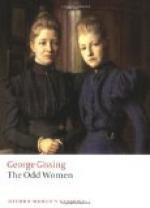Instead of writing, she had resolved to see Bevis again—if it were possible. Perhaps he would not be at the flat; yet his wish might suggest the bare hope of her coming to-day. The risk of meeting Barfoot probably need not be considered, for he had told her that he was travelling to-day into Cumberland, and for so long a journey he would be sure to set forth in the morning. At worst she would suffer a disappointment. Indulgence of her fervid feelings had made her as eager to see Bevis as she was yesterday. Words of tenderness rushed to her lips for utterance. When she reached the building all but delirium possessed her.
She had hurried up to the first landing, when a footstep behind drew her attention. It was a man in mechanic’s dress, coming up with head bent, doubtless for some task or other in one of the flats. Perhaps he was going to Bevis’s. She went forward more slowly, and on the next landing allowed the man to pass her. Yes, more likely than not he was engaged in packing her lover’s furniture. She stood still. At that moment a door closed above, and another step, lighter and quicker, that of a woman, came downstairs. As far as her ear could judge, this person might have left Bevis’s flat. A conflict of emotions excited her to panic. She was afraid either to advance or to retreat, and in equal dread of standing without purpose. She stepped up to the nearest door, and gave a summons with the knocker.
This door was Barfoot’s. She knew that; in the first instant of fear occasioned by the workman’s approach, she had glanced at the door and reminded herself that here Mr. Barfoot dwelt, immediately beneath Bevis. But for the wild alarm due to her conscience-stricken state she could not have risked the possibility of the tenant being still at home; and yet it seemed to her that she was doing the only thing possible under the circumstances. For this woman whom she heard just above might perchance be one of Bevis’s sisters, returned to London for some purpose or other, and in that case she preferred being seen at Barfoot’s door to detection as she made for her lover’s.
Uncertainty on this point lasted but a few seconds. Dreading to look at the woman, Monica yet did so, just as she passed, and beheld the face of a perfect stranger. A young and good-looking face, however. Her mind, sufficiently tumultuous, received a new impulse of disturbance. Had this woman come forth from Bevis’s fiat or from the one opposite?—for on each floor there were two dwellings.
In the meantime no one answered her knock. Mr. Barfoot had gone; she breathed thankfully. Now she might venture to ascend to the next floor. But then sounded a knock from above. That, she felt convinced, was at Bevis’s door, and if so her conjecture about the workman was correct. She stood waiting for certainty, as if still expecting a reply to her own signal at Mr. Barfoot’s door. The mechanic looked down at her over the banisters, but of this she was unaware.




